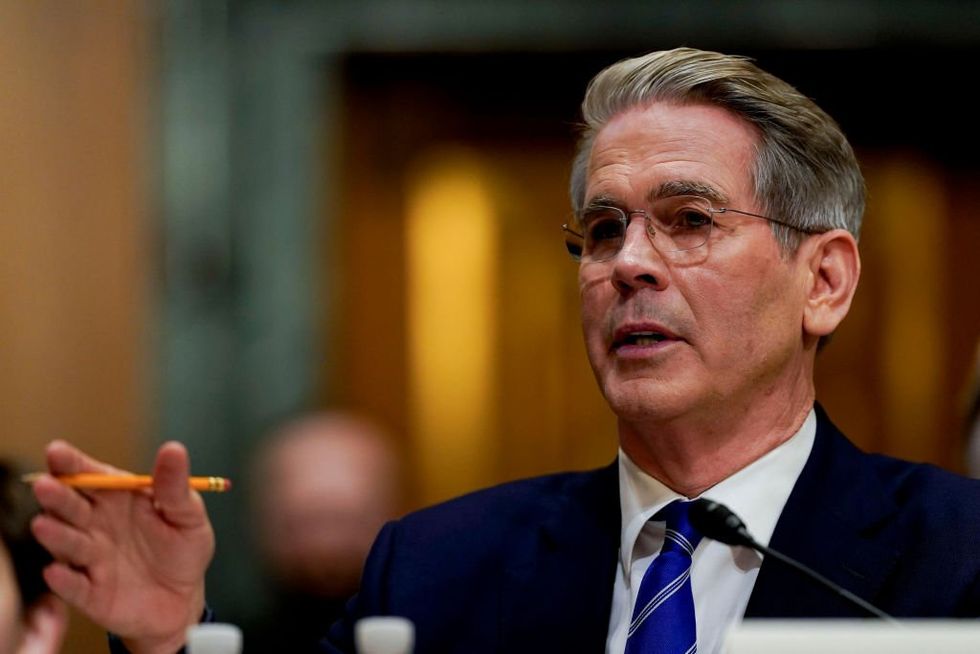Here's what Trump's win means for schooling in America — and the Education Department
President-elect Donald Trump has big plans for education in America. When asked about what the Republican has in mind, Trump-Vance transition spokeswoman Karoline Leavitt told Time, "The American people re-elected President Trump by a resounding margin, giving him a mandate to implement the promises he made on the campaign trail. He will deliver." If Trump delivers on his campaign promises and corresponding Agenda47 plan for education, then the Education Department as it now exists is toast, and most of its present responsibilities are likely headed back to the states. Extra to hollowing out the Education Department, Trump has also promised universal school choice; protections for prayer in public schools; a prioritization of reading, writing, and arithmetic and an ejection of leftist propaganda; a switch from tenure to merit pay for teachers; and a federal reinforcement of parental rights. In a September 2023 video outlining his ten principles for improving schools, Trump noted, "The United States spends more money on education than any other country in the world. And yet we get the worst outcomes. We are at the bottom of every list. In total, American society pours more than a trillion dollars a year into public education systems. But instead of being at the top of the list, we are literally right smack — guess what — at the bottom." According to the Education Data Initiative, K-12 public schools blow through around $857.2 billion annually, with the federal government covering at least 13.6% with taxpayer funds. Costs have grown rapidly over the years. The nationwide public K-12 annual spending per pupil in the 2011-2012 school year was $10,648. This year, the per-pupil cost for a substandard education was $17,280. Despite the U.S. ranking fourth among Organization for Economic Co-operation and Development members for spending on elementary education, the quality of education leaves much to be desired. Recent estimates from the National Literacy Institute indicated that roughly 40% of students across the nation cannot read at a basic level. The National Center for Education Statistics revealed that when compared to 80 other nations' education systems in 2022, the U.S. average math literacy score for 15-year-old students was lower than the average in 25 education systems. The NAEP also found that as of 2022, only 26% of eighth-grade public school students across the country were proficient in math. A Pew Research Center survey revealed earlier this year that 51% of American adults figure the public K-12 education system is headed in the wrong direction. A separate survey of public school teachers found that 82% of respondents figured the state of education has worsened over the past five years. 'You can't do worse.' "Rather than indoctrinating young people with inappropriate racial, sexual, and political material, which is what we're doing now, our schools must be totally refocused to prepare our children to succeed in the world of work, and in life and the world of keeping our country strong, so they can grow up to be happy, prosperous, and independent citizens," said Trump. The once and future president indicated that in order to optimize education and schools in America, it is necessary to: "respect the rights of parents to control the education of their children"; "empower parents and local school boards to hire and reward great principals and teachers, and also to fire the poor ones"; "ensure our classrooms are focused not on political indoctrination, but on teaching the knowledge and skills needed to succeed"; "teach students to love their country"; "support bringing back prayer to our schools"; institute "immediate expulsion for any student who harms a teacher or another student"; "ensure students have access to project-based learning experiences inside the classroom"; "strive to give all students access to internships and work experiences that can set them on a path to their first job"; and "ensure that all schools provide excellent jobs and career counseling." Trump also indicated that his administration would effectively "close" the Education Department, which has been a Cabinet-level agency since 1980, and send "all education and education work and needs back to the states." "We want [the states] to run the education of our children, because they'll do a much better job of it," said Trump. "You can't do worse. We spend more money per pupil, by three times, than any other nation. And yet we're absolutely at the bottom. We're one of the worst. So you can't do worse. We're going to end education coming out of Washington D.C. We're going to close it up — all those buildings all over the place and yet people that in many cases hate our children. We're going to send it all back to the states." 'I figure we'll have like one person plus a secretary.' Blaze News reached out to the Education Department but did not immediately receive a response.


President-elect Donald Trump has big plans for education in America.
When asked about what the Republican has in mind, Trump-Vance transition spokeswoman Karoline Leavitt told Time, "The American people re-elected President Trump by a resounding margin, giving him a mandate to implement the promises he made on the campaign trail. He will deliver."
If Trump delivers on his campaign promises and corresponding Agenda47 plan for education, then the Education Department as it now exists is toast, and most of its present responsibilities are likely headed back to the states.
Extra to hollowing out the Education Department, Trump has also promised universal school choice; protections for prayer in public schools; a prioritization of reading, writing, and arithmetic and an ejection of leftist propaganda; a switch from tenure to merit pay for teachers; and a federal reinforcement of parental rights.
In a September 2023 video outlining his ten principles for improving schools, Trump noted, "The United States spends more money on education than any other country in the world. And yet we get the worst outcomes. We are at the bottom of every list. In total, American society pours more than a trillion dollars a year into public education systems. But instead of being at the top of the list, we are literally right smack — guess what — at the bottom."
According to the Education Data Initiative, K-12 public schools blow through around $857.2 billion annually, with the federal government covering at least 13.6% with taxpayer funds. Costs have grown rapidly over the years.
The nationwide public K-12 annual spending per pupil in the 2011-2012 school year was $10,648. This year, the per-pupil cost for a substandard education was $17,280.
Despite the U.S. ranking fourth among Organization for Economic Co-operation and Development members for spending on elementary education, the quality of education leaves much to be desired.
Recent estimates from the National Literacy Institute indicated that roughly 40% of students across the nation cannot read at a basic level. The National Center for Education Statistics revealed that when compared to 80 other nations' education systems in 2022, the U.S. average math literacy score for 15-year-old students was lower than the average in 25 education systems. The NAEP also found that as of 2022, only 26% of eighth-grade public school students across the country were proficient in math.
A Pew Research Center survey revealed earlier this year that 51% of American adults figure the public K-12 education system is headed in the wrong direction. A separate survey of public school teachers found that 82% of respondents figured the state of education has worsened over the past five years.
'You can't do worse.'
"Rather than indoctrinating young people with inappropriate racial, sexual, and political material, which is what we're doing now, our schools must be totally refocused to prepare our children to succeed in the world of work, and in life and the world of keeping our country strong, so they can grow up to be happy, prosperous, and independent citizens," said Trump.
The once and future president indicated that in order to optimize education and schools in America, it is necessary to:
- "respect the rights of parents to control the education of their children";
- "empower parents and local school boards to hire and reward great principals and teachers, and also to fire the poor ones";
- "ensure our classrooms are focused not on political indoctrination, but on teaching the knowledge and skills needed to succeed";
- "teach students to love their country";
- "support bringing back prayer to our schools";
- institute "immediate expulsion for any student who harms a teacher or another student";
- "ensure students have access to project-based learning experiences inside the classroom";
- "strive to give all students access to internships and work experiences that can set them on a path to their first job"; and
- "ensure that all schools provide excellent jobs and career counseling."
Trump also indicated that his administration would effectively "close" the Education Department, which has been a Cabinet-level agency since 1980, and send "all education and education work and needs back to the states."
"We want [the states] to run the education of our children, because they'll do a much better job of it," said Trump. "You can't do worse. We spend more money per pupil, by three times, than any other nation. And yet we're absolutely at the bottom. We're one of the worst. So you can't do worse. We're going to end education coming out of Washington D.C. We're going to close it up — all those buildings all over the place and yet people that in many cases hate our children. We're going to send it all back to the states."
'I figure we'll have like one person plus a secretary.'
Blaze News reached out to the Education Department but did not immediately receive a response.
Ted Mitchell, president of the American Council on Education, told Time, "It is entirely feasible to close down the Department of Education, but the functions of the Department of Education will need to continue."
With the Republican trifecta in Washington, D.C., Trump will likely be able to significantly reduce or possibly even cut funds for racist DEI and critical race theory programming.
Virginia Rep. Ben Cline (R) recently told Fox Business that it would be possible to slash trillions of dollars in government spending as Elon Musk, the potentially oncoming Department of Government Efficiency head, has proposed.
When asked where deep cuts could be made, Cline said, "Well, let's just look at the Department of Education and how billions of dollars stay in Washington, funding bureaucrats whose simple goal is to interfere in the decisions about educational choice at local and state levels."
In October, Trump signaled at a campaign rally in Milwaukee, Wisconsin, what his ideal Education Department would look like after he's done with it:
I figure we'll have, like, one person plus a secretary. You'll have a secretary to a secretary. We'll have one person plus a secretary, and all the person has to do is, "Are you teaching English? Are you teaching arithmetic? What are you doing? Reading, writing, and arithmetic. And are you not teaching woke?"
"All they're going to do is see that the basics are taken care of," added Trump.
Trump's proposal in some ways resembles the memorandum advanced in 1981 by President Ronald Reagan's Education Secretary Terrel H. Bell, which advocated for turning the department into a foundation tasked primarily with administering block grants, collecting information, and conducting research.
Education Weekly reported at the time that Bell's unrealized proposal suggested that most of the department's activities would ultimately be "transferred, terminated, or modified as new Administration policies are implemented." For example, the functions for the department's Office for Civil Rights could be moved to the Justice Department.
Like Blaze News? Bypass the censors, sign up for our newsletters, and get stories like this direct to your inbox. Sign up here!
Originally Published at Daily Wire, World Net Daily, or The Blaze
What's Your Reaction?

































































































